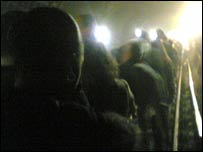For the record, I was one of those who joined the Labour Party after the UK election of last May. Soon after that, I voted for Jeremy Corbyn as Leader of the Labour Party and Tom Watson as Deputy.
I think that what is happening in the Labour Party is a sorry and miserable mess, but also by far the most creative thing going on in UK politics at present. We are in much greater danger from the present government of the disguised Far Right with its certainties and dis-honesties and treacheries and lies, its denial of and contempt for community and trust, than we are from Labour’s present turmoil and confusion. And there is far more hope of a coherent shape emerging from the Progressive Left that is both honourable and sufficient for present times, than there is from the hooligan crew of sleek PR deceivers presently running this nation. Their way leads to our destruction, and also their own.
And, for the record, this is what I replied in answer to Corbyn’s e-mailed round-robin, requesting views on joining the bombing war on ISIS :
“Thank you for your message.
I agree with the position you have taken.
Yes, ISIS have to be fought and defeated. They make nonsense of being human. They make only monstrosity. It seems they exist precisely to make nonsense and monstrosity of pretty well everything.
But by massing together and bombing them from on high, the western forces have chosen the best possible way of merely adding to the power, appeal and threat of ISIS. It is not an army as such. It can’t be bombed away from on high, as if in some computer game. Just restricted for now, at best. Unable to centre itself in a particular place, it will just scatter to everywhere.
By further joining those bombing forces, the UK will ensure it joins the ranks of first degree targets for revenge, while fuelling yet further a highly volatile situation in the Middle East and across the world.”
And here are a few stumbling thoughts I put together after the Paris bombings :
“To try to understand the killing, it is of course relevant to think in terms of Islam, Sunni Islam, the Iraqi war, Syria, Western bombings and how all these and other particular factors have come together and brought about a new act of mass murder and self-murder.
But I just think that it is even more relevant to think of these events as if it were all one. In other words, the main point is that this (and similar atrocities) is not another way of life, another place, or another race, doing something hostile to Us and Ours.
There is no Them here. This is Us.
Our own way of life and being has given birth to a tendency among us which prefers random killing followed by suicide, to continuing to live. A preference for filling surroundings with Death over leaving them to Life.
So we have to look to ourselves, not to “Them.” “We will now wage war on Isis” is the most fatuous response, the one Isis will want, and the way most likely to ensure that deaths will continue and escalate.
These bombings by drone from on high were just one way, perhaps the most obvious, to ensure the deaths of all these people in Paris. There was no other response possible to such behaviour and now there will be more of it. Death by drone, death by suicidal gunman, what’s the difference ? Actually a huge difference. But they belong together and, hating both, I cannot see one as virtuous or necessary, compared to the other.
I’m remembering my early lessons in Christian teaching and my utter bewilderment at Christ’s directions to “turn the other cheek”. What ? Just do it again ? The “pale Galilean” was what DH Lawrence called Christ and maybe this was what he was talking about. I could only hear it as incomprehensible passive aggressive nonsense. But I am pretty sure now that I at last understand what Christ actually meant. He was alive when the eye for an eye, tooth for a tooth obligation was still seen as a matter of honour, almost a sacred duty. But this meant that killing would never stop. Endless circles, each death requiring another. But revenge is not justice, and another response is required than just revenge. But here, all these centuries later, we still are doing exactly the same, in the leaders’ response to the Paris shootings, and Christ is still light years ahead of us, being crucified again and again in our time. He was trying to replace the revenge killing mind-set with something more sensible, for our sakes. He is still failing. We are still failing Him.
It is not a matter of inviting ISIS to hit us again. It is a matter of enquiring very deeply of our own way of life, which is the way of life which has partly created ISIS, and from which it gathers its recruits : what do we do that makes young people so hating of existence that they prefer death to it ? What can we do that will restore meaning and hope in life to our own people ?”


